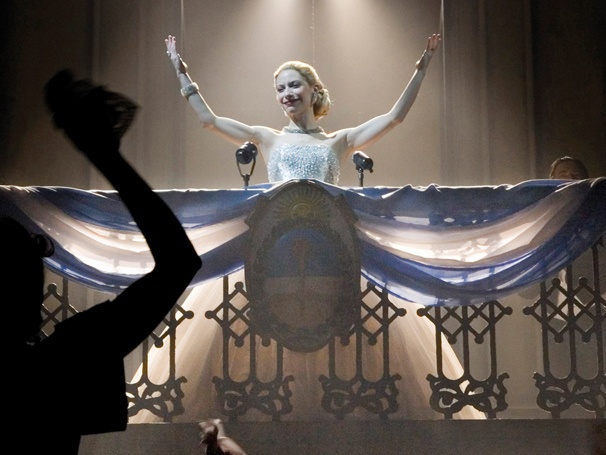I was apprehensive about seeing Evita this past Friday. I had heard a lot of gripes about the production, and about the lead actress's, Elena Roger's, voice. Roger definitely had an Edith Piaf quality, so much that I was yearning for "La Vie en Rose" by the time "Don't Cry for Me" rolled around. I have an even bigger gripe than her voice quality, though, and that is the very strange accent in which she sang. For most of the show, she sounded French to me, and, at some points, her husband sounded Scottish! My friend and I were humming "Where in the World Is Carmen San Diego?" to each other during interludes; those actors did NOT sound like they were in Argentina. My friend, Greg, made a good point about this singing-in-accent ordeal when he noted that Shakesperian productions, though often set in Italy, are written and performed in English not Italian. Isn't that the beauty of them? Thank God Shakespeare wasn't trying to throw in Italian catchphrases or, worse, having Romeo flip his R's. I'm not sure why this director thought otherwise, especially since Roger is Argentinian, and her debut role was as Evita Peron (!!!) in earlier production.
 |
| Image c/o googleimages.com |
As far as other gripes go, there was a major lack of narrative. They were highlighting moments of Evita's life rather than giving a fluid story, which was confusing (to the point where I thought she was a promiscuous person, not a paid prostitute, for a good portion of the show). Also, I was not at all impressed with Ricky Martin, although Greg was raving about his performance. And, about singing everything, I'm not a huge fan of that, either. Apparently, Evita is marketed as a "rock-musical" (bad bad bad bad idea), which puts the show in the tradition of Rent, Spring Awakening, and Next to Normal. Audiences who are not comprised entirely of angsty, fifteen-year-old girls will probably find the style of all of these shows to be really terrible, as they should.
 |
| Image c/o googleimages.com |
Now that I've complained extensively about the show, I guess I should admit that I didn't hate it. In the end, I walked away with an absolute fascination with Eva Peron, who I knew nothing about prior. I've already read her entire Wikipedia page and will probably take out a few books on her life because I'm confused, and intrigued, and amazed. And I think that's exactly what the show was trying to do.
In fact, we know this is the show's motive from Roger's voice, which warns us that this isn't a sit-back-and-relax-Anything-Goes performance, but that this is something that is supposed to probe us and bother us and, well, leave our ears ringing (and it did!). So much about Eva (and her fame) is pure allure, but the show challenges to not mindlessly accept her as Glinda the Good Witch. I don't know that her voice quality indicates that her character was bad, but it brought me to the realization that, for all her fame, Eva Peron's true talent is marketing herself. She's a regular Hilton/Kardashian! Indeed, she's not truly an actress, or a diplomat, or a singer, or a "spiritual leader," as Wiki dubs her, (I'll refrain from crass prostitute jokes here), and she's not a goddess or a philanthropist or a scam artist, but she's a person who knew exactly how to market her image/persona and was incredibly successful at it. Just like the Hiltons/Kardashians, Evita is someone of whom we should be skeptical, but needn't necessarily hate outright. By the final bows, it was clear to me that my opinion of Eva Peron should fall somewhere between those of the Argentines praying for the repose of her soul in the first scene, and the regime that stole her body and hid it for seventeen years, the reality of which we are slapped with in the last. Admittedly, I'm far from enamored with the production, but I am semi-obsessed with Eva Peron's life and legacy, and almost haunted by the blurbs of life displayed in front of me for two hours. In that way, the cast and crew of Evita won.

No comments:
Post a Comment